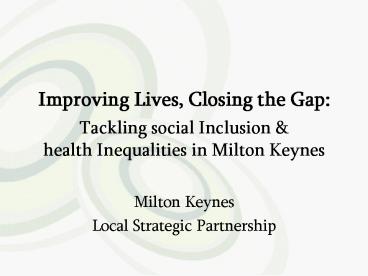Improving Lives, Closing the Gap: Tackling social Inclusion - PowerPoint PPT Presentation
1 / 27
Title:
Improving Lives, Closing the Gap: Tackling social Inclusion
Description:
Index of Multiple Deprivation 2004. The Main Determinants of Health ... Conniburrow, Eaglestone, Fishermead, Fullers Slade, Granby, Greenleys, Hodge Lea, ... – PowerPoint PPT presentation
Number of Views:47
Avg rating:3.0/5.0
Title: Improving Lives, Closing the Gap: Tackling social Inclusion
1
Improving Lives, Closing the GapTackling
social Inclusion health Inequalities in Milton
Keynes
- Milton Keynes
- Local Strategic Partnership
2
(No Transcript)
3
(No Transcript)
4
(No Transcript)
5
(No Transcript)
6
(No Transcript)
7
Milton Keynes Floor targetsWeaknesses
8
Milton Keynes Index of Multiple Deprivation 2004
9
The Main Determinants of Health
10
Milton Keynes expectation of life by ward
11
What approaches can we use?
- Person based
- e.g. people elderly living alone
- Settings based
- e.g. schools
- Area based
- e.g. places experiencing multiple disadvantage
12
How can we add value?
- Do better with what we have got
- Target the money thats allocated to MK
- Win new money
13
Why identify areas of multiple disadvantage?
- To better support the many people living there in
addressing their needs and wants - To transform areas so that people are not
disadvantaged by where they live
14
Sustained intervention three broad themes
- Economy skills / learning
- Environment and transport
- Social fabric and services (relevance, quality
and access)
15
Identifying areas for action
- Using Social Atlas identified 20 most deprived
estates in MK the key problems affecting those
estates. - Beanhill, Central MK, Coffee Hall, Conniburrow,
Eaglestone, Fishermead, Fullers Slade, Granby,
Greenleys, Hodge Lea, Leadenhall, Neath Hill,
Netherfield, New Bradwell, Oldbrook, Stacey
Bushes, Stantonbury, Tinkers Bridge, Water Eaton
Wolverton.
16
Highest priority areas
- Beanhill
- Netherfield
- Coffee Hall
- Granby
- Fishermead
- N Bradville (3 streets)
- Tinkers Bridge (social housing)
- Stantonbury (nr Nr Wood End School)
- Oldbrook (social priority housing)
17
Pilot
- Understand the aspirations of the community of
through dialogue - Work with residents and local bodies e.g.
Woughton Parish Council / Woughton Alliance - Develop a programme with the community its
representatives - Seek practical action from wide range of LSP
members - Seek and use new funds e.g. LPSA2, SEEDA monies
- Link area renewal and growth
18
LSP Year of Social Inclusion
- Aims
- that all LSP members are / become actively
involved in practical action - The public of Milton Keynes, particularly people
who are part of communities most at risk of
social exclusion / poor health, become more fully
involved, better equipped and better supported in
tackling the problems they face.
19
Partnership Challenge
- How can your organisation
- influence social inclusion through its role
within the wider community - benefit from increasing capacity to deliver
change.
20
Initial programme of events
- LSP workshop - 23 June 2005
- 2) We can do it action on social inclusion and
health inequalities. - 10 October 2005 Open University
- 3) Early 2006 larger public event
21
We can do it action on social inclusion and
health inequalities
- Speakers
- Messages from Beanhill
- Opportunity for partners to celebrate work they
are proud of - Partner challenge to propose something practical
they might do - Monday 10 October between 17 30 21 00hrs Open
University - Refreshments and Buffet
22
Social Inclusion Mini-Bus Tours of MK
- Limited number of places free to those who sign
up this evening - Dates will be arranged according to demand
23
Contact Details
- For further information on the Year of Social
Inclusion and to book a poster presentation for
the October event please contact - Apple Ivory 01908 252376
- Apple.ivory_at_milton-keynes.gov.uk
24
23 June Workshop Aims
- To stimulate LSP members to think about
practical action - To involve LSP members in shaping the programme
- To generate ideas
25
Task 1
- On your own
- suggest practical actions that you would like to
see taken to promote social inclusion and /or
reduce health inequalities. - Write each suggestion on a new post-it note.
26
Task 2
- With your neighbour.
- For each post-it note, decide which of the
following three categories best describes the
theme the intervention suggested is intended to
improve
- Economy skills / learning
- Environment and transport
- Social fabric and services (relevance, quality
and access)
27
Task 3
- As a group
- Develop at least one and no more than three
practical proposals for tackling social inclusion
and/or health inequalities that could be
delivered in an area experiencing multiple
deprivation. - What contributions could members of the LSP make
to these actions?
28
Facilitators notes
- Introduce members
- Identify a scribe and rapporteur
- Summarise and clarify the task
- Invite people to look again (if they want to) at
the post-it notes and comment on what they have
read - Focus the group on identifying and fleshing out
the proposal they want to put to the LSP (in as
much detail as possible) preferably a proposal
that would involve at least one member of your
group in delivering the proposal - Get suggestions about potential contributions of
LSP members































